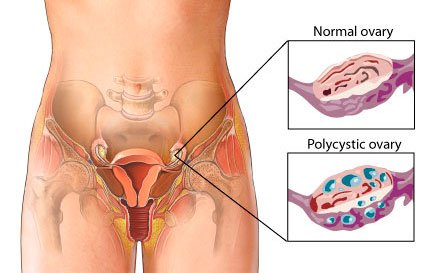PCOS – PolyCystic Ovarian Syndrome
PolyCystic Ovarian Syndrome (PCOS) is a common hormonal disorder that affects people with ovaries of reproductive age. PCOS is characterized by an imbalance in reproductive hormones, leading to various symptoms and potential complications. While the exact cause of PCOS is not fully understood, genetic and environmental factors are believed to play a role in its development.
The primary features of PCOS include irregular menstrual cycles, excess androgen levels (male hormones), and the presence of multiple small cysts on the ovaries. These cysts are follicles that have not developed properly due to hormonal imbalances. The irregular menstrual cycles associated with PCOS can manifest as infrequent periods, prolonged periods, or unpredictable bleeding patterns.
PCOS can present with a wide range of symptoms, including acne, hirsutism (excessive hair growth on the face, chest, or back), hair thinning or baldness (male-pattern baldness), weight gain or difficulty losing weight, and darkening of the skin, particularly along skin folds such as the neck creases, groin, and underneath the breasts (acanthosis nigricans). Insulin resistance and obesity are common comorbidities associated with PCOS, increasing the risk of type 2 diabetes and cardiovascular disease.
Diagnosis of PCOS is typically based on a combination of medical history, physical examination, and laboratory tests. Diagnostic criteria include the presence of irregular menstrual cycles, excess androgen levels (as indicated by clinical symptoms or blood tests), and the appearance of polycystic ovaries on ultrasound imaging.
Treatment for PCOS aims to manage symptoms, reduce the risk of complications, and improve fertility outcomes for those trying to conceive. Lifestyle modifications such as regular exercise, a balanced diet, and weight management are often recommended as first-line interventions to improve insulin sensitivity and regulate menstrual cycles. Hormonal contraceptives, such as birth control pills or hormone-containing intrauterine devices (IUDs), may be prescribed to regulate menstrual cycles, reduce androgen levels, and alleviate symptoms such as acne and hirsutism.
For individuals trying to conceive, fertility medications such as clomiphene citrate or letrozole may be prescribed to induce ovulation. In cases of infertility due to PCOS, assisted reproductive technologies (ART) such as in vitro fertilization (IVF) or intrauterine insemination (IUI) may be considered. Managing PCOS requires a comprehensive and individualized approach, often involving a multidisciplinary team of healthcare providers, including gynecologists, endocrinologists, nutritionists, and mental health professionals, to address the complex needs of affected individuals.



.png)
